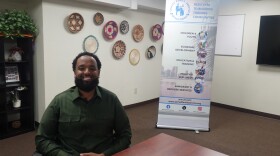DEBBIE ELLIOTT, host:
Many welfare-to-work programs focus on getting people the skills they need for entry-level jobs. But one program in Austin, Texas hopes to broaden the horizons of low-income workers by offering them access to college-level liberal arts courses.
From member station KUT, Sarah Bush reports.
SARAH BUSH: The lights are dim and the set minimalist at the B. Iden Payne Theater here in Austin. One group of mostly middle-aged patrons sits clustered in the first two rows. They take notes so they'll be prepared for class next week.
(Soundbite of play)
BUSH: For Maryanne Ramos(ph), Shakespeare is a whole new world.
Ms. MARYANNE RAMOS (Free Minds Student): I've always wanted to know about Shakespeare. I always was really thinking that I was afraid to maybe read a play because I didn't know what it was going to all entail.
BUSH: Before coming tonight, Ramos and her classmates in the Free Minds Project read Hamlet and they watched the 1996 Hollywood movie. Ramos watched it on a DVD with her five-year-old daughter, Natalia.
Ms. RAMOS: I think this is going to be a way of me experiencing with her this whole phenomenal aspect of theater, especially Shakespeare, and be able to actually explain it to her.
BUSH: At 44, Ramos says she finally has a chance to earn a college degree. She doesn't want her daughter to miss out on an educational opportunities she did. That's the whole point of the Free Minds Project, to give low-income people like Ramos the chance to study the great works of theater, history and philosophy. It's modeled on a similar program in New York.
A week before they saw Hamlet, students gathered at a community center for a lecture on Herodotus, by University of Texas Professor Tom Palaima. He's one of six professors teaching the 22 students enrolled in Austin's Free Minds course.
Professor TOM PALAIMA (University of Texas, Austin): The normal way in which you approach somebody who's disadvantaged is to say we'll give them practical training. But that still makes - leaves them feeling as if they're not a full member of society.
BUSH: Palaima says he was the first in his family to go to college, so he understands the thin line between privilege and poverty.
Prof. PALAIMA: How do you become a full member of society? One of the ways you do that is by saying you can share in the intellectual traditions, the cultural traditions.
BUSH: If students complete the all-expenses paid course and make at least a C, they earn six transferable college credits. Ramos plans to use hers toward a teaching degree.
Ms. RAMOS: I figured, you know, I could ear 62 hours in a matter of less than 18 months, if I really push myself. And I intend to do that.
BUSH: Ramos says she's not going to pass up this chance. She was raised by her Spanish-speaking grandparents in San Antonio, who didn't read or write. College was never an option, so after high school, Ramos started working low-wage jobs. Now she's a file clerk and also a single mom.
The Free Minds course is a whole new ballgame. Though exciting, Ramos says the subject material is intimidating. She's gotten a lot of help, especially from project director Sylvia Gale.
Ms. RAMOS: Basically, when we got our introduction letter, Sylvia did make a note, get a five-subject notebook. I had no idea what that was, only that I went to Target and I found a five-subject notebook. And then I started organizing myself.
BUSH: At her modest, one-bedroom apartment, she's set up a workspace in a corner of her living room. Pens and papers are stacked neatly on the table.
Ms. RAMOS: Here we've got Nations to Nations. That's a history edition.
BUSH: She has her books assembled on a nearby shelf.
MS. RAMOS: And then, again, another great book about Homer. I can't - I'm going to really get into this one, I think.
BUSH: Why?
Ms. RAMOS: Because it's poetry. It's Greek poetry. And it just is going to really expand my mind to really research every single word that I can't even pronounce in this book.
BUSH: In these kinds of programs, only half the students tend to make it all the way through. Already this year, three students in Austin have dropped out. But Maryanne Ramos says nothing is going to stop her now. A better future is at stake, not only for herself, but also her daughter.
For NPR News, I'm Sarah Bush in Austin, Texas. Transcript provided by NPR, Copyright NPR.





